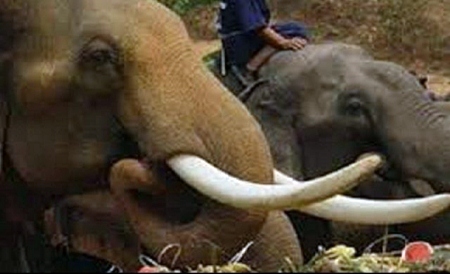BANGKOK, Jan 22 – Ivory traders nationwide are being required to register with the authorities within 30 days and have certificates of origin to identify ivory goods to prevent illegal trade and the smuggling of African elephant tusks.
The action is the first of its kind taken by the Department of National Parks Wildlife and Plant Conservation since it was empowered by the Commerce Ministry. The department met with traders of tusks and ivory products to inform them.

The move came after the World Wildlife Fund, an international conservation group, said last week that “massive quantities” of African ivory are being imported illegally into Thailand, where they are carved into Buddhist statues, bangles and jewelry that are then sold to tourists or smuggled elsewhere.
It urged Thailand to ban all ivory trading, warning that rising demand for tusks is fueling an unprecedented slaughter of elephants in Africa.
Theerapatr Prayoonsitthi, department deputy director-general said the UN Convention on International Trade in Endangered Species (CITES) banned all international ivory trade in 1989 and asked Thailand to tighten measures against the illegal smuggling of ivory.
As ivory from domesticated elephants can be traded legally, to prevent smuggling of African tusks, he said the department instructed about 100-200 local ivory traders across the country to register with the commerce ministry within a month and that their ivory must be documented, showing the origins of their goods.
The department will randomly check traders to ensure they comply with the regulations. Any violator will be subject to serious legal action, the senior official said.
The department has stored about ten tonnes of confiscated tusks pending the prosecution of the cases in the court, Mr Theerapatr said.
They were registered and kept records and closely monitored to prevent them being stolen for sale in the market. Ivory has a street value of roughly 50,000 baht per kilogramme, he added.




